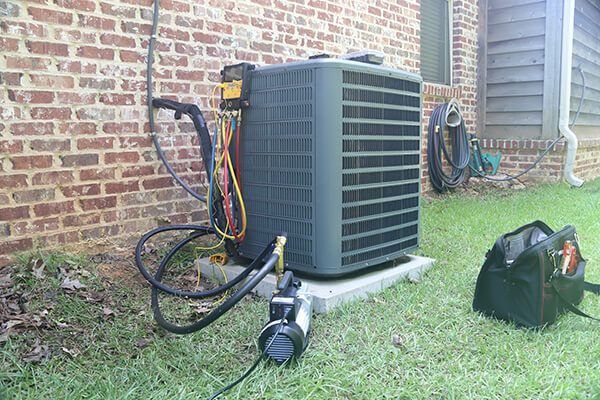
You depend on your air conditioner to keep you safe and comfortable during the summer. However, it is when the heat and humidity are at their worst that these systems tend to break down. Here are the common issues you may face as the weather continues heating up.
Low Airflow
The first thing you are likely to notice is less air coming from your output vents. This indicates an airflow restriction somewhere in your system. The first place to check for a restriction is at your air filter, which you should replace about every 90 days.
However, there are many other airflow restrictions your system may experience. Tiny particles make it past the filter and settle farther in your system. This settlement occurs commonly at the evaporator coil and heat exchanger.
Particles also build up on the circulating fan and further within your ductwork. Routine professional maintenance is the best option for preventing most of these airflow restrictions from forming.
You may also experience a freeze in your system. If your evaporator coil freezes, it prevents air from flowing properly through the coil.
Frozen System
Your air conditioner works by transferring heat from inside your home to the air outside through the refrigerant. In order to make this happen, your system must regulate the up and down refrigerant pressure.
Refrigerant gets cold when the pressure drops, which is what cools the air in your system. However, if the refrigerant’s pressure drops when it shouldn’t, or it drops too much, it causes the system to freeze.
A refrigerant leak is the most common cause of a drop in refrigerant pressure and a freeze occurring within the system. A leak inside your home, such as at the evaporator coil, also poses a health hazard.
In addition to a refrigerant leak, an airflow restriction may cause the system to freeze. When your air filter clogs, it prevents enough air from flowing into your HVAC system. This means the refrigerant cannot absorb the right amount of heat, leaving it too cold.
Contaminants collecting on the evaporator coil can also lead to system freezes. These create a type of insulation on the coils, which prevents heat transference as well. These contaminants also absorb moisture, compounding the freeze when it happens.
Tripped Circuit Breaker
Your air conditioner should not trip the breaker under normal circumstances. However, as the heat outside intensifies, your breaker may trip.
Typically, when the breaker trips, it means there is a problem with the air conditioner’s compressor. This is the component that raises the refrigerant pressure before it enters the condensing coil. The compressor is already the largest draw of electricity in the system.
There are many issues that may cause your compressor to strain, leading it to draw more electricity. One of the primary issues being the low refrigerant in the system.
In addition to low refrigerant, problems within the compressor may cause it to strain. If you have a damaged compressor, you are likely looking at a new one, which is a very costly repair. Depending on the age of your system, you may want to look at a system replacement.
Outside of the compressor, there are seven other problems that may cause your breaker to trip. A substantial airflow restriction could cause the breaker to trip, though this is not as common. Additionally, your breaker may trip because of a loose wire or electrical connection, condensing fan motor malfunction, or power surges.
If your circuit breaker trips, you should have a professional get at the cause. Ignoring it and continuing to push the breaker back on can cause substantial damage to your system. It may also pose a significant safety risk, leading to an electrical fire.
Warm Air From Your Vents
When you turn your air conditioner on, you expect to get cool air coming from your vents. However, when the system isn’t running correctly, you may notice warm and humid air coming through it instead.
The first question would be if there is enough refrigerant in the system. Without the right amount of refrigerant, the entire system doesn’t pressurize properly. This means that when it flows into the evaporator coil, there is no pressure drop, so it doesn’t get cold.
The next question is when was the last time your system had professional maintenance? If it has been more than a year, it may be a dirty evaporator coil preventing proper cooling.
Next, what is the condition of your outside condensing unit? If it cannot draw enough air in through the condensing coil, the refrigerant will retain too much heat. This prevents it from getting as cold as it should, reducing overall cooling.
Debris around your condensing unit and damage to the condensing coil can inhibit proper airflow. Ideally, keep at least 12 inches of clearance around and above your unit to ensure air can move properly.
Another common restriction is weeds growing up around the condensing unit. Be careful using a power trimmer around your unit as these can easily damage the coils.
Loud Sounds
Sounds from your air conditioner can tell you a lot about what is happening inside. While sounds themselves may not be a problem, they certainly tell you a problem is happening and can help you avoid a catastrophic failure.
A common sound you may hear is a loud buzzing, especially if your system is getting older. This usually indicates an electrical problem with one of your components. The usual suspects for a buzzing sound are the capacitor or one of the fan motors going bad.
You may also hear a rattling sound from your unit, especially if it hasn’t had maintenance recently. This is caused by components loosening as the system runs, including the condensing fan cage or the fan blades.
Chattering is a very distinct sound you will hear when the condensing contactor goes bad. This component acts as the switch to start the compressor at the start of the cooling cycle.
Your fan motors may give off a loud squealing sound when they are going bad. Oftentimes, this squealing is the result of the fan bearings going bad, which is preventable when they are lubricated regularly.
Banging and clanking sounds should also draw your awareness. This typically means something has broken loose and is bouncing around. The compressor is the most common location for these parts to break loose.
Creeping Energy Consumption
Whether you experience any other symptoms, keep an eye on your energy bill. If you notice your energy consumption is continually climbing, even during mild weather, you know you have a problem. This consumption is how you determine efficiency, so if you consume more, your system is operating less efficiently.
Airflow restrictions are the most common cause of efficiency degradation. Be sure to change your filters regularly and have your system maintained annually.
Additionally, low refrigerant or wearing components lead to efficiency problems. The goal of annual maintenance is to keep your system running at peak efficiency and catch small problems early.
People around Annapolis rely on Beltway Air Conditioning & Heating for the best residential and commercial HVAC service. Our expertly trained technicians provide heating and cooling installation, maintenance, repair, and indoor air quality solutions. Call us to schedule your air conditioner service today.


